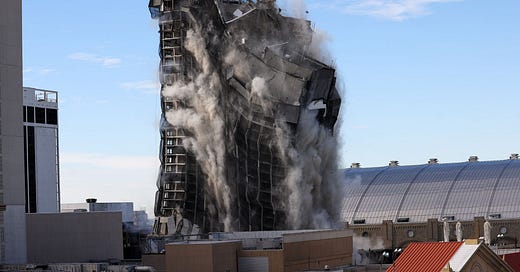Trauma and the Crushing Weight of History
We live in a world where anything better seems impossible and the weight of changing anything feels too heavy to bear
Sometimes life is strange.
All right. Life is mostly strange, but that strangeness is only accentuated by a host of coincidences that are so odd they often inspire alternate realities and conspiracy theories for people desperate for explanations. Sometimes these coincidences are massive and glaring, almost daring us to put them into some framework. Other times it’s as small as thinking of someone we haven’t heard from in a very long time and them calling us a few minutes later.
An article written by James Robins for The New Republic entitled “Can Historians Be Traumatized By History” was a small bit of coincidence for me inasmuch as I’ve been asking myself this very question a lot lately. I began my strange little political journey back in 2015, covering rallies leading up to the presidential election, and then falling in headfirst into America’s political discourse. Since then, I’ve been trying to swim instead of sink, relearning everything I know about history and culture in order to understand how exactly we’ve arrived at this moment where the world feels mad, off-kilter, and like any attempt to change it for the better would be unbearably difficult or, on my worst days, literally impossible.
My last attempt to make sense of this was American Rule: How A Nation Conquered The World But Failed Its People, a reconsideration of American history absent the lie of American Exceptionalism that worked from the Founding to Donald Trump. What I found, in the writing of that book, completely upended everything I thought I knew about our past, replaced it with legitimate stories of our history, and, in places, gave me hope that we might just right this ship.
Currently, I’m working on a new project, tentatively titled The Midnight Kingdom, which is a reconsideration of the history of “Western Civilization,” from the Roman Empire to this moment. It is…the hardest thing I’ve ever done. Tracking the history of power, politics, economics, and religion over the course of two millennia is an exhausting undertaking in terms of research alone. But documenting the horrors of history, the wanton massacres, the torture, the exploitation of generations of human beings, the lies, the manipulations, the greed and wanton brutality, is another thing altogether. It is haunting. Disturbing.
And, in a word, traumatic.
Dispatches From A Collapsing State is an independent project by Jared Yates Sexton. If you support his work and want to unlock additional material - this week he’ll be answering subscribers’ questions in a new, weekly mailbag Q&A - please consider subscribing and contributing to this endeavor.
I am a survivor of trauma. We all are. For me, it’s a matter of living through this pandemic, the rise of fascism in this country, the awful, awful denial we’ve seen of reality, of the dangers we face, ranging from climate change to the intentional and systematic destruction of our politics. It has been a burden to carry. But, like all of you, I have my own burdens.
As a child, I grew up impoverished, terrified constantly of whether there’d be food on the table, money to pay for utilities, and, along with poverty, untreated mental health, and the resulting dance of tragedies, physical, emotional, and verbal abuse. My childhood was a swirl of anxieties and an absolute nightmare on any given day.
When I talk to a therapist about those experiences and attempt to work my way through their aftereffects, what I am often most struck by is how, even though they are past, they still feel so disturbingly present. Even though I haven’t seen my physically abusive stepfather in thirty-five years his voice still lurks in my head, defining in my worst moments how I see the world and myself.
This is one of the terrible secrets of trauma. It lingers. It grows. It compounds. And for anyone who has ever found themselves in an abusive situation, there is a tendency to feel, because of the abuse, because of the voice which oftentimes stays beyond the experience or outside of the abuser, as if the world is very narrow, very defined, very rigid, and, in a word, inescapable. The idea that any other life is possible seems an absurdity.
Looking back, on those years, sorting through the screams and insults and punches and kicks, it feels like a totally different life to me. How could I have ever lived that way? How could the world have ever felt like that?
What doesn’t get talked about much is that history is a story told by a storyteller. There are choices as to what to include, what to let go, and how to focus, portray, and communicate some point about the trajectory of human civilization. History has an agenda, whether that agenda is to tell the truth or obscure it.
America is a particularly important case of this. While writing American Rule what I kept finding was that the idea of American Exceptionalism, or American greatness, was a sales-pitch sold by the white, wealthy, and powerful to undermine reform movements so that they might consolidate more wealth and more power. That was true with the Fouding and it was true when Ronald Reagan became president in 1981, his victory in part secured by his framing of the United States as “the Shining City on the Hill” and his promise to “Make America Great Again.”
But, like MAGA now, the question remains: when exactly was America great? When the Constitution guarenteed the power of slavers in order to stave off revolutions by the poor and forgotten people? In the 1950’s, when segregation and the white supremacist conditions of the South remained unchecked, women were still openly discriminated against, and LGBTQ Americans had to live in fear? What about after Reagan was elected and he destroyed the social safety net, dismantled trust in government as a public good, and handed the economy over to the wealthiest Americans?
This is what happened and our actual story. To really deal with America we must deal with our past, ugliness and all. By ommitting tragedies like the genocide of Native Americans, the enslavement of millions, the constant, unthinkable oppression of vulnerable populations, we lose a sense of reality, we lose our ability to pinpoint our problems, and we lose our ability to understand our problems and solve them.
But Jared, you say, look at the actual story. Look at the forces of power. They are huge. They are massive. They have the ability not only to slaughter, to oppress, to enslave, and to even wield violence, but also the ability to rewrite history and warp reality in order to hide those very things.
How, you ask, could we ever do anything against something so powerful?
A lot of the time, when I write about these subjects, or post about them on social media like Twitter, what I see are responses that there is nothing we can do. That the problems and forces I am describing are so entrenched, so difficult, and so powerful that surely there isn’t anything to be done. To even begin the process would be to open ourselves up to defeat and disappointment and possibly even suffer worse treatment than if we didn’t fight in the worst place.
There’s some truth here. In researching The Midnight Kingdom I’m finding so many instances of attempts to change the world not only being put down, but the people suffering in terrible ways. History is littered with reformers being tortured, burnt alive, ostracized, intimidated, disappeared. Even mass movements meet similar fates. In England, the peasants revolted all the way back in 1381. The German peasants rebelled in 1524 and even demanded representative government and freedom, declaring “we should be free and wish to be so,” a full two hundred years before America won its independence.
Both rebellions resulted in tragedy. After capturing London and earning a meeting with the king in which he freed them from serfdom, the English peasants were largely rounded up, tortured, and killed. In Germany, nobles marshalled their resources, hired mercenaries, and engaged in widespread, unfathomable cruelties.
Reading accounts of the people of the so-called “New World” be killed, tortured, imprisoned, and exploited, not to mention the millions of Africans who were bought and sold and killed, has been exhausting and depressing. The things I’ve read have invaded my waking hours, my dreams, affected the way I see the world.
But that doesn’t mean I should stop or that anyone else doing this work should look away. To just resign ourselves to these things, to throw up our hands and say another world is impossible, is the end-goal of the people who perpetrate these things. To quit would mean that the years and years and years of efforts to silence people, the intimidation, the torture, the killing, had served its purpose.
It is no coincidence that, as calls for reform gain purchase, the violence and intimidation in this country has gotten worse. This is their only move beyond the warping of reality. If that isn’t enough, if the story doesn’t keep the people at bay, the next step is to threaten them with social pressures, economic threats, and promises of violence. If those don’t work, violence and torture and murder are sure to follow. We’ve already seen this, and to gaze at the American Right at this moment is to look upon the terrifying truth that their desperation and anger are growing by the second.
But very quickly, a word. History, actual, real, honest history, is not just the chronicle of abuse and oppression. It may seem that way with the pages upon pages of crimes and abuses, but to look between the lines, to investigate those abuses, is to find survival in the face of power. It is to see an incredible human spirit to continue to fight and to continue to survive. And, despite that violence, what we see is that humanity has continued to fight against power and find space for itself, to change things, to advocate for reform and advancement of humanity. It is slow, and no, it does not naturally bend toward justice without muscle bending it, but it is the story of hope and possibility.
The story of people looking at where they are, how far they have come, and wondering how it could have been any other way.






OMG i so badly needed this today. Thank you Jared. Hang in.
Thank you for this piece. "Looking back on those years ... it feels like a totally different life to me. How could I have ever lived that way? How could the world have ever felt like that?" Probably nothing you've written has resonated with me as much as this. In my experience, surrounding oneself with passionate, caring people who give a damn is the best antidote to surrender; it re-calibrates one's perspective and makes the old horrors seem more awful in retrospect, which is a kind of trauma in itself. When you re-interpret your personal past, you think, how did I ever allow this to go on? That personal truth-telling process is a microcosm of what you're experiencing as you read our collective history. It's scary how easily we can adapt and get used to being surrounded by abuse.